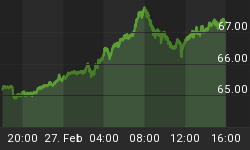I thought there was a decent chance that the riots in Egypt would blow over during the weekend. Not so - the protests continue apace and tomorrow the protestors are planning a "million-man march" with the handicappers giving some chance of actually getting to that figure. But the capital markets panic appears to have ebbed. Flight-to-quality didn't last long! The dollar erased today its Friday gains and bonds reversed Friday's gains. Stocks recovered, although not even half of the prior decline, and oil actually extended its rally and popped to new 28-month highs above $92/bbl. Inflation breakevens rose 5-10bps as TIPS rallied strongly.
The Chicago ISM (neé Purchasing Managers') report provided an upside surprise which provided the initial push lower for bonds and helped equity investors overlook Intel's announcement that a chip glitch would result in lower near-term earnings. As the chart below shows, the Chicago PM index is as high as it has been since 1988. Caution, however, it warranted in interpreting this fact. The Chicago PM index, like the national ISM, is a relative index measuring respondents' indication of whether activity is higher, lower, or the same as one month ago. It is therefore a rate of change measure rather than a level measure. An economy that has been going incredibly slow is more likely to provide very high rates-of-change when things start to improve simply because the denominator is so poor - which is why the highest readings for this index came in the early 1970s and early 1980s after really ugly recessions.

It's easier to improve from a lower base.
While we must be careful, therefore, to avoid over-interpreting the level of Chicago PM, the fact that it is rising strongly is another confirmation that at least for now the economy has escaped the gravity well of the recent recession. That is far from an assurance that this will continue, and as I always take pains to point out it is even farther from an assurance that the stock market, fully valued as it is, will continue to do well.
It also doesn't provide as much insight as you might think into tomorrow's national ISM number (Consensus: 58.0 from 57.0). The two move generally together, but month-to-month the movements are in the same direction about two-thirds of the time. However, the size of the Chicago move certainly increases the chance that the direction of the national ISM will be positive.
Mondays recently have been pretty slow, and while I am surprised that today followed that pattern I expect it will persist for a few days. Mainly, that is because the Midwest is expected to get some two feet or so of snow in a snowstorm lasting a couple of days. Weather in the NY area won't be great either, but it takes quite a bit more to bury Chicago. The weather means that the Chicago Mercantile Exchange will be less populated. While a lot of the price action is now electronic, a substantial amount of risk capital still stands on the floor and liquidity will probably be impacted. Again.
Other than the ISM and car sales, there isn't a lot on tap for tomorrow anyway, and with employment figures due later in the week it would ordinarily - if Egypt wasn't restive - be a slam-dunk to be a quiet day. Less liquidity, in the context of potential violent geopolitical events, doesn't necessarily imply a quiet day of market movement, however. Downdrafts in stocks and updrafts in bonds are likely to be more pronounced while exchange liquidity is offline, so be careful.
.
I want to make sure that regular readers of this column do not miss the "one off" pieces I have been publishing that drill down into CPI. The most recent, yesterday, looked "under the hood" at Transportation inflation in the CPI; it is interesting where inflation is, and is not, coming from in that group (which is roughly one-sixth of the overall CPI). My purpose in looking deeper at the major subgroups is to try and better define some of the underlying trends and themes in inflation. Inflation isn't just one thing; it comes in many flavors. Take a look at this piece.
Tomorrow, I will talk about an interesting new way you can track inflation daily, with surprising accuracy.















